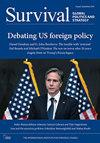Europe’s China Problem: How Not to Feed Beijing’s Military–Civil Fusion
IF 1.9
3区 社会学
Q2 INTERNATIONAL RELATIONS
引用次数: 0
Abstract
Abstract This essay explores the question of restricting China’s access to European dual-use technology. Under Xi Jinping, the Chinese Communist Party is transforming China into a techno-security state. The country’s innovation-driven development strategy and strengthened push for military–civil fusion, fuelled by powerful industrial policies, have made technology exchanges with China a challenging policy issue in Europe. The issue is not only a bilateral one with China – it constitutes a challenge for the management of the transatlantic alliance as well, given that US intervention has at times been a decisive factor shaping European policies vis-à-vis China, mostly through targeted action regarding specific issues of technology transfers. The European Union has developed a toolbox of defensive instruments in the past five years to address asymmetries and imbalances in EU–China trade and investment relations, providing European decision-makers with the instruments to manage technology transfers to China. This toolbox still needs to be perfected, however. The EU is only now starting to develop a political narrative linking China’s military build-up, its powerful industrial and innovation policies, and Xi’s vision for Chinese leadership in world affairs. In the absence of a shared European vision, technology transfers will remain a sporadic irritant in transatlantic relations.欧洲的中国问题:如何不满足北京的军民融合
摘要本文探讨了限制中国获取欧洲军民两用技术的问题。在强有力的产业政策的推动下,中国创新驱动的发展战略和加强军民融合的推动,使得与中国的技术交流在欧洲成为一个具有挑战性的政策问题。这个问题不仅是与中国的双边问题——它也构成了对跨大西洋联盟管理的挑战,因为美国的干预有时是影响欧洲对华政策的决定性因素,主要是通过针对技术转让等具体问题采取有针对性的行动。欧盟在过去五年中开发了一个防御性工具工具箱,以解决欧盟与中国贸易和投资关系中的不对称和不平衡问题,为欧洲决策者提供了管理对华技术转让的工具。然而,这个工具箱仍然需要完善。在欧洲缺乏共同愿景的情况下,技术转让仍将是跨大西洋关系中的一个偶尔的刺激因素。
本文章由计算机程序翻译,如有差异,请以英文原文为准。
求助全文
约1分钟内获得全文
求助全文
来源期刊

Survival
Multiple-
CiteScore
2.10
自引率
16.70%
发文量
88
期刊介绍:
Survival, the Institute"s bi-monthly journal, is a leading forum for analysis and debate of international and strategic affairs. With a diverse range of authors, thoughtful reviews and review essays, Survival is scholarly in depth while vivid, well-written and policy-relevant in approach. Shaped by its editors to be both timely and forward-thinking, the journal encourages writers to challenge conventional wisdom and bring fresh, often controversial, perspectives to bear on the strategic issues of the moment. Survival is essential reading for practitioners, analysts, teachers and followers of international affairs. Each issue also contains Book Reviews of the most important recent publications on international politics and security.
 求助内容:
求助内容: 应助结果提醒方式:
应助结果提醒方式:


